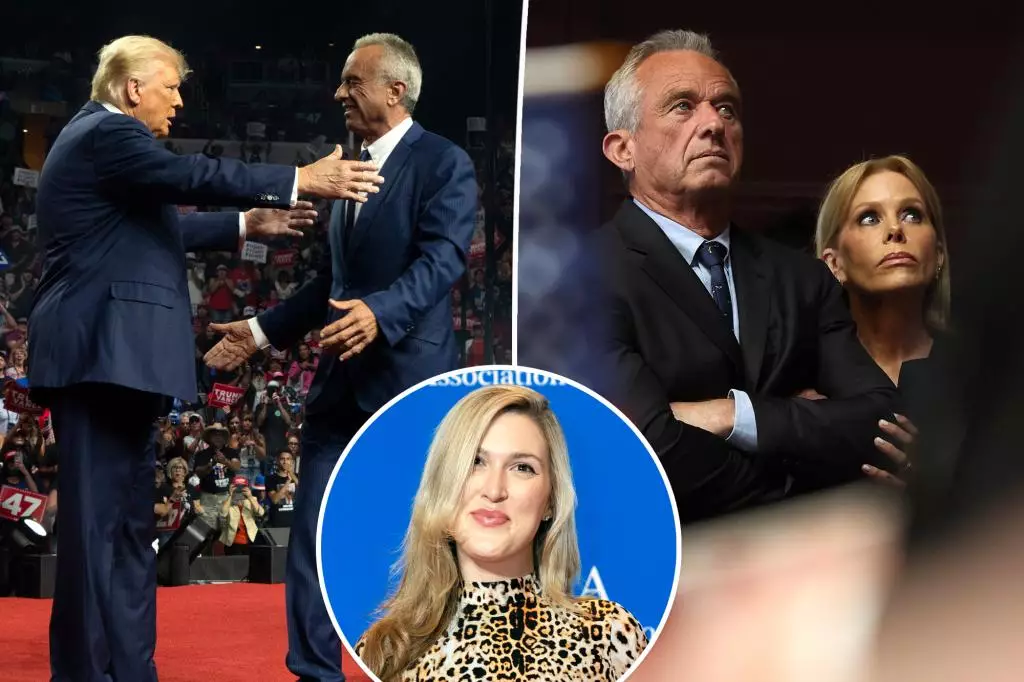The convergence of personal scandal and political ambition creates a fascinating narrative, particularly in the case of Robert F. Kennedy Jr. Recently, numerous allegations about his personal relationships have arisen, painting a picture that raises questions about the intersection of morality and political strategy. This scenario not only involves Kennedy’s alleged affairs but also prompts analysis of how such controversies impact political trajectories in today’s context.
Following the disclosure of a controversial relationship with New York Magazine journalist Olivia Nuzzi, Kennedy has found himself in hot water. Nuzzi, who wrote a profile on Kennedy, has alleged a digital romance that some sources describe as having included intimate exchanges, although Kennedy has denied any physical element to their relationship. Since the rumors surfaced in September, three additional women have reportedly come forward, alleging romantic involvements with Kennedy, adding layers of complexity and intrigue to the unfolding narrative.
What stands out about these revelations is not purely their scandalous nature, but the fact that they exist in a political sphere that seems increasingly indifferent to personal failings. Political insiders have commented on the low stakes of such a scandal in the modern political landscape, suggesting that, contrary to what one might expect, Kennedy’s alleged indiscretions may not harm his standing but could potentially enhance it. As one source noted, “In D.C., this is barely a scandal.”
The changing guard of political culture suggests a departure from the stringent moral expectations of the past, particularly reminiscent of the George W. Bush years. There’s a stark contrast between former standards of accountability and the current tolerance displayed by many in the GOP. Several insiders have posited that the modern Republican Party is less concerned with the personal lives of its members than it is with electoral viability and operational strategy. As articulated by one MAGA source, “We are not policing what people do in their bedrooms. People don’t care.”
This evolution reflects a broader shift in public consciousness, where the line between private and public life continues to blur. Voters appear less inclined to dwell on the moral failings of their political candidates, focusing instead on their overall effectiveness and alignment with core party principles. In an age where scandal can sometimes be spun into a narrative of resilience or ‘realness,’ Kennedy may stand to gain rather than lose ground.
Despite the apparent apathy toward Kennedy’s situation among political insiders, the implications of his alleged affairs extend beyond mere public perception. As a recent report indicated, Kennedy’s personal life could affect his ability to secure security clearances, potentially limiting his job options within a Trump administration. However, numerous roles exist that do not require such assessments, particularly in health-related sectors—a field in which Kennedy has extensive expertise due to his advocacy work.
Nevertheless, the concern that additional allegations could surface looms over Kennedy’s political future. Trump’s team seems to be cautiously observing the evolving situation, assessing whether the news cycle will move on or if Kennedy’s entanglements will prove to be a persistent issue. Speculation abounds that an ongoing spotlight might affect the dynamics between Kennedy and Trump, especially given Trump’s own history with personal controversies.
Kennedy’s past reveals a complicated web of relationships that precedes the allegations. His connection to significant figures within the realm of politics has sparked speculation about the implications of his private life on his public role. His diaries, allegedly detailing ‘lust demons’ and sexual encounters, suggest a man whose personal choices may have long shadowed his public persona. Such a history inevitably complicates conversations around his suitability for high-stakes political roles.
Moreover, as we consider the political landscape shaped by figures like Trump—whose own allegations of infidelity are well-documented—it’s clear that the interplay between personal conduct and political ambition is evolving. In an age defined by scandal, the public may loudly proclaim a desire for transparency and integrity yet seem equally comfortable with the acceptance of flawed characters climbing the political ladder.
As Robert F. Kennedy Jr. navigates this tumultuous chapter of his life, the dialogue surrounding his relationships raises important questions about the nature of scandal in politics today. Will he emerge unscathed, or will the weight of allegations and public perception ultimately shape his political legacy? What is clear is that in a dynamic political environment, the standards of accountability continue to redefine themselves, shaping the destinies of those ambitious enough to seek positions of power and influence. The trajectory of Kennedy’s career amidst these challenges will serve as a telling case study in the ongoing narrative of American politics.


Leave a Reply